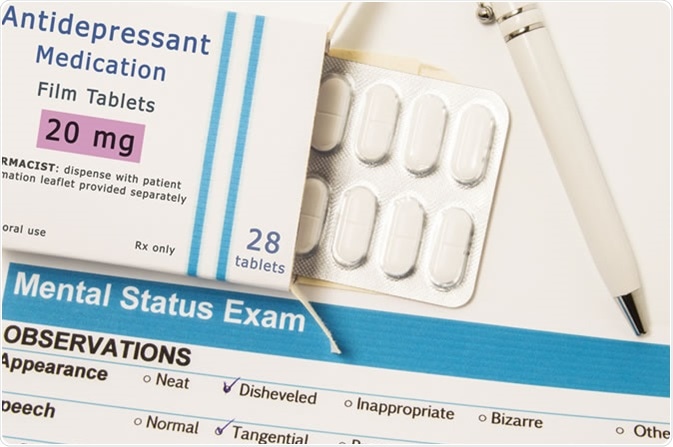
Antidepressants and Weight Changes
Skip to:
Antidepressants can be an effective treatment option for severe depression. Unfortunately, they can cause various side effects including weight gain. These side effects must be considered by medical professionals before prescribing antidepressants.

Antidepressant Medications or drugs. Image Credit: Shidlovski / Shutterstock
How is Depression Treated?
Treatment for depression usually comes in one of three forms: self-help strategies, therapies, and medication.
Typically, effective treatment will involve a combination of these treatment types. Exercise is a form of self-help that may help with depression as the release of endorphins while exercising can reduce the negative psychological symptoms of depression.
Cognitive-behavioral therapy (CBT) and counseling can also be used to treat depression, as both can help to address the root causes of an individual's depression and aid in breaking them down so they are less overwhelming.
CBT mainly focuses on present problems and practical ways to improve your state of mind, whereas counseling can focus on the past and the potential triggers of someone’s depression.
For severe depression, antidepressant medication may be considered as a treatment option.
There approximately 30 different antidepressant medications, that can be split up into different categories:
- Selective serotonin reuptake inhibitors (SSRIs)
- Serotonin-noradrenaline reuptake inhibitors (SNRIs)
- Noradrenaline and specific serotonergic antidepressants (NASSAs)
- Tricyclic antidepressants (TCAs)
- Monoamine oxidase inhibitors (MAOIs)
SSRIs are the most widely prescribed category of antidepressant as they cause the fewest side effects and an overdose has less serious consequences compared to others.
SNRIs are similar to SSRIs but some people respond better to these drugs than SSRIs. NASSAs can be effective for people who are not able to take SSRIs; they have similar side effects to SSRIs but they can cause more initial drowsiness.
TCAs and MAOIs are older types of antidepressants and are not used as frequently because they are associated with more serious side effects.
The number of patients diagnosed with depression is increasing, and thus the prescription of antidepressant drugs is also on the rise, which is exemplified by the number of antidepressants being prescribed almost doubling between 1995 and 2001.
How do Antidepressants Affect Weight?
Antidepressant drugs have been associated with weight gain, but the nature of this association is poorly understood. This is due to reasons such as the suboptimal procedure of many studies (very few of the studies performed had extensive follow-ups to assess the effects of antidepressants on weight gain) and the variation between different antidepressant medications.

Image Credit: Monkey Business Images / Shutterstock
Additionally, there are few studies that investigate the impact of antidepressant treatment on weight gain on a population-wide scale.
A recent UK population-based cohort study has attempted to look at the long-term effects of antidepressant use on weight gain. The researchers tracked the weight of over 290,000 people using electronic records of their visit to their GP practice over a decade. They found that over this time period patients who were prescribed an antidepressant had an increased risk of gaining at least five or more percent of their body weight when compared to those who had never been prescribed an antidepressant.
The authors of the study also highlighted that this risk increased during the second and third year of antidepressant treatment but patients who had been treated for less than a year did not seem to be affected although this could be due to lack of data on these participants.
This increased weight gain risk was maintained during the first 6 years of follow-up during the study. Subsequently, this increased risk of weight gains also leads to an increased incidence of participants transitioning into higher BMI categories.
This study ultimately shows that antidepressant treatment is associated with a risk in weight gain over at least 5 years.
The study highlighted other associations between BMI category and antidepressant use, with 13.9% of people with normal BMI being prescribed with antidepressants whereas 26.5% of people with a BMI over 45 were prescribed antidepressants.
The study also identified an association between increased antidepressant use in participants with other co-morbidities such as stroke and diabetes. Additionally, antidepressant use was also increased with individuals that are currently smoking tobacco.
With the weight gain varying between antidepressant drug classes, the risk of weight gain should be considered by medication professionals when antidepressants are being considered as a treatment option.
Sources
- nhs.uk. (2019). Clinical depression. https://www.nhs.uk/conditions/clinical-depression/
- nhs.uk. (2019). Cognitive behavioural therapy (CBT). https://www.nhs.uk/conditions/cognitive-behavioural-therapy-cbt/
- nhs.uk. (2019). Antidepressants. https://www.nhs.uk/conditions/antidepressants/
- Gafoor, R., et al. (2018). Antidepressant utilisation and incidence of weight gain during 10 years’ follow-up: population based cohort study. BMJ. https://dx.doi.org/10.1136%2Fbmj.k1951
- Serretti A and Mandelli L. (2010). Antidepressants and body weight: a comprehensive review and meta-analysis. J Clin Psychiatry. DOI: 10.4088/JCP.09r05346blu, https://www.ncbi.nlm.nih.gov/pubmed/21062615
Further Reading
Last Updated: Sep 26, 2019
































No hay comentarios:
Publicar un comentario